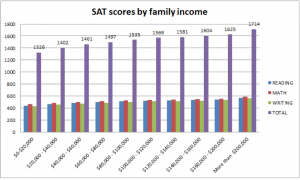It is not surprising that many first generation students struggle with the process because of all that is required of applicants. When students come from a family or school that offers little guidance in navigating the process, they are much more likely to struggle and give up because they do not have a strong support system. In one study on first-generation students, 87% reported navigating the entire process alone (Banks-Santilli). Some students in the United States have countless tutors and family members helping them, but almost all first generation students must do everything themselves. One student explains: “I had to be more independent. My parents didn’t fill out the applications. I had to help them complete the FAFSA (financial aid form). I picked a school, registered for the SATs, took the ACTs, and like…the whole process of it …I had to be on my own” (Banks-Santilli). Students from affluent backgrounds and those with a parent who attended college automatically have a distinct advantage over those who are first-generation. They have a family that understands and supports them in the process which is invaluable and much more likely to help them succeed. The majority of first-generation students are racial minorities which compounds multiple disadvantaged groups in the process (“First-generation Students”).
 (Goldfarb)
(Goldfarb)
Although the typical college student is becoming more middle class, first generation students and racial minorities are still struggling (Rothwell). The majority of the benefits of wider college access seem to be flowing to white and asian students and not black students (Rothwell). First generation students usually come from a much lower economic background and those who are not: the “median family income at two- and four-year institutions for freshman parents who didn’t attend college is $37,565, compared with $99,635 for whose who parents did” earn a college degree (Mangan). Families with parents who went to college earn over double those whose did not which shows the lingering effects of the past: students today are disadvantaged if their parents were less successful which creates a cycle. Those first-generation students that do attend college tend to go to community colleges, trade schools, or lower quality universities, which perpetuates unfairness in the college admissions process (Rothwell).